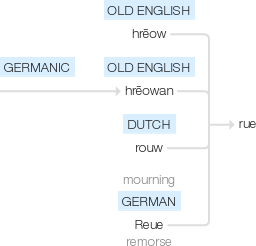Rue
Old English hrēow ‘repentance’, hrēowan ‘affect with contrition’, of Germanic origin; related to Dutch rouw ‘mourning’ and German Reue ‘remorse’.
wiktionary
From Middle English rewe, reowe, from Old English hrēow(“sorrow, regret, penitence, repentance, penance”), from Proto-West Germanic *hreuwu(“pain, sadness, regret, repentance”).
From Middle English rewen, ruwen, ruen, reowen, from Old English hrēowan(“to rue; make sorry; grieve”), perhaps influenced by Old Norse hryggja(“to distress, grieve”), from Proto-Germanic *hrewwaną(“to sadden; repent”).
From Middle English rue, from Anglo-Norman ruwe, Old French rue, from Latin rūta, from Ancient Greek ῥυτή(rhutḗ).
etymonline
rue (v.)
Old English hreowan (class II strong verb; past tense hreaw, past participle hrowen), "make (someone) sorry, cause (someone) to grieve, distress, affect with regret," transitive senses now obsolete, from Proto-Germanic *khrewan (which is source also of Old Frisian riowa, Middle Dutch rouwen, Old Dutch hrewan, German reuen "to sadden, cause repentance").
It is in part it has been blended with the Old English weak verb hreowian "feel pain or sorrow," and perhaps influenced by Old Norse hryggja "make sad." Both are from Proto-Germanic *khruwjan, all from PIE root *kreue- (2) "to push, strike" (see anacrusis).
The meaning "repent of, feel remorse for, feel regret for something or how it happened," is attested by c. 1200; the intransitive sense of "be sorrowful or penitent, experience grief" is recorded from 14c. Related: Rued; ruing.
King John. France, thou shalt rue this hour within this hour. ["King John," Act III, Scene 1]
rue (n.1)
perennial evergreen shrub, native to the Mediterranean and western Asia, used in cooking and highly esteemed in the Middle Ages as a medicine, late 14c., from Old French rue (13c.), earlier rude, from Latin ruta "rue," probably from Greek rhytē, a word of uncertain etymology, originally a Peloponnesian word for the common Greek pēganon, itself probably a Pre-Greek word, and some consider Latin ruta and Greek rhytē rather as common borrowings from a Mediterranean language.
The plant's disagreeable odor and the bitter taste of its leaves led to many punning allusions to rue (n.2.). Related: Rutic; rutaceous.
rue (n.2)
"sorrow, repentance," Middle English reue, from Old English hreow "grief, repentance, sorrow, regret, penitence," from Proto-Germanic *hrewwo "pain; sadness, regret, repentance," source also of Frisian rou, Middle Dutch rou, Dutch rouw, Old High German (h)riuwa, German reue "sorrow, regret, repentance," nouns from the root of rue (v.).
rue (n.3)
French for "street," from Vulgar Latin *ruga (source also of Old Italian ruga, Spanish rua "street in a village"), from Latin ruga, properly "a furrow," then in Medieval Latin "a path, street," (see rugae).
